In a groundbreaking study, researchers at Columbia University Vagelos College of Physicians and Surgeons have discovered that an injectable emulsion containing omega-3 fatty acids found in fish oil holds the potential to reduce brain damage in newborn rodents after oxygen deprivation during delivery.
Brain damage due to insufficient oxygen during labor and delivery is a severe complication affecting newborns, with significant implications for their future health. This condition, which impacts one to three out of every 1,000 live newborns in the US, can lead to cerebral palsy, cognitive impairment, epilepsy, pulmonary hypertension, and neurodevelopmental disorders among survivors.
The study's findings also revealed that this novel omega-3 preparation outperformed therapeutic hypothermia, the current standard therapy for oxygen deprivation-related brain damage in newborns. Therapeutic hypothermia, while approved by the FDA, only benefits about 15% of patients and carries the risk of heart and respiratory complications.
Previous research by Professor Richard Deckelbaum at Columbia University has shown that commercially available oral omega-3 supplements, while containing bioactive compounds, take weeks or months to exert their protective effects, making them less suitable for immediate organ protection after injury.
The new diglyceride formulation, however, is expected to facilitate rapid penetration of omega-3 molecules across the blood-brain barrier. Administered to week-old mice and rats with hypoxic brain injury, the experimental emulsion demonstrated a significantly greater reduction in brain damage compared to a commercially available omega-3 injectable emulsion, despite similar dosage levels.
The effectiveness of the experimental emulsion may be attributed to its faster absorption into the bloodstream, occurring twice as quickly as the commercial emulsion.
Notably, animals treated with the new therapy exhibited normal motor coordination and reflexes, indicating preserved neurological function akin to those without brain injuries.
According to Professor Deckelbaum, "The omega-3 diglyceride emulsion not only prevented brain cell death but also preserved neurological function, which is crucial in mitigating the burden of disabilities on both patient well-being and the healthcare system."
The researchers anticipate commencing clinical trials in newborns within two years, with plans to further investigate the therapy's efficacy in preventing central nervous system damage in animals with traumatic brain injury and spinal cord injury. Additionally, they aim to explore its potential applications in other acute injuries and conditions where oxygen deprivation leads to organ damage, such as heart attack and stroke.

 The effectiveness of the experimental emulsion may be attributed to its faster absorption into the bloodstream, occurring twice as quickly as the commercial emulsion.
The effectiveness of the experimental emulsion may be attributed to its faster absorption into the bloodstream, occurring twice as quickly as the commercial emulsion.










.jpeg)



.jpeg)

.jpg)





.png)





.jpg)
